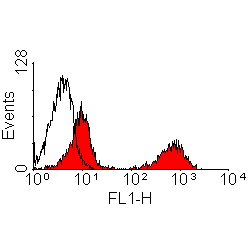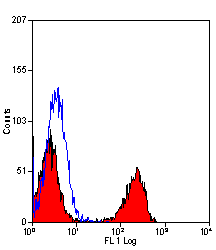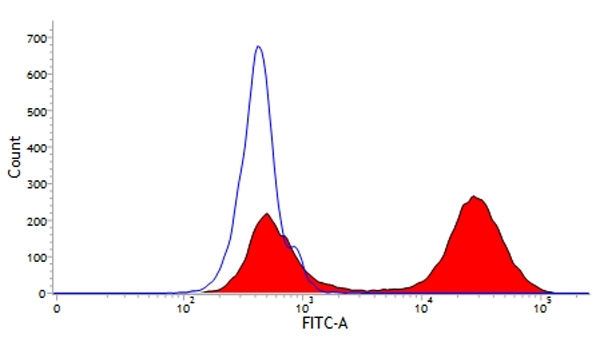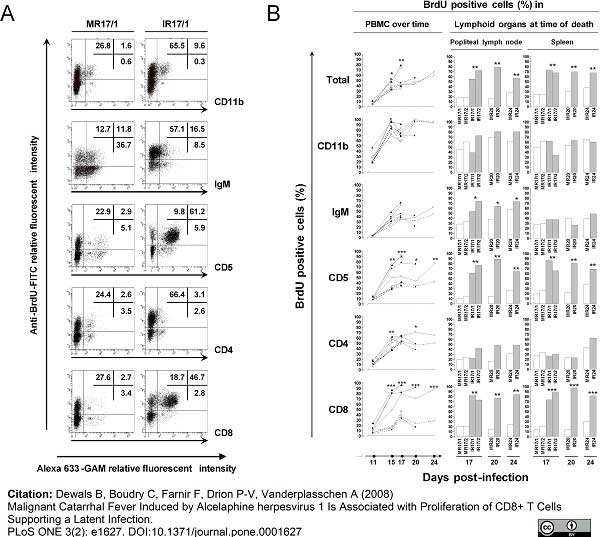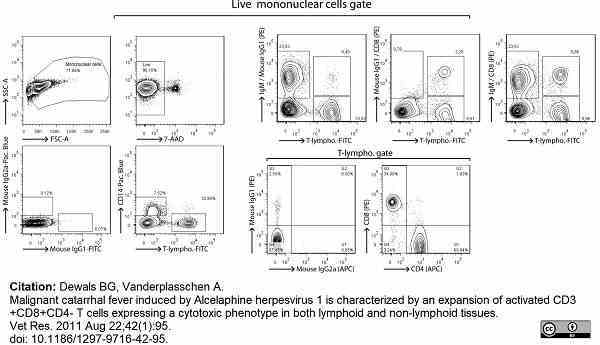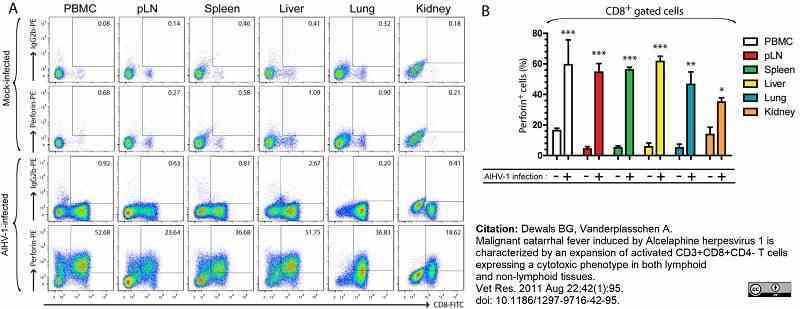T Lymphocytes antibody | KEN-5






Mouse anti Rabbit T Lymphocytes:FITC
- Product Type
- Monoclonal Antibody
- Clone
- KEN-5
- Isotype
- IgG1
- Specificity
- T Lymphocytes
| Mouse anti Rabbit T lymphocytes, clone KEN-5, recognizes rabbit (lapine) T-cells. Clone KEN-5 recognizes >90% thymocytes and approximately 40-45% mesenteric lymph node cells and immunoprecipitates a ~67 kDa protein from rabbit thymocytes. In contrast to humans and mice where only a very small population of B-cells express the CD5 antigen, in rabbits it is widely expressed by peripheral blood B cells. However, the KEN-5 antibody, while originally reported as recognizing rabbit CD5 (Kotani et al.1993), does not bind to rabbit CD5 transfectants. Furthermore, clone KEN-5, unlike other known antibodies recognizing rabbit CD5 and anti human cross reactive CD5 antibodies, shows very limited binding to rabbit B-cells, which in adult rabbits express CD5 (Raman & Knight 1992) Clone KEN-5 may recognize a epitope that is dependant on glycosylation to maintain its structural configuration which may explain why this antibody does not recognize recombinant rabbit CD5 produced in insect cells which contain different glycans from those found in mammalian cells. KEN-5 may distinguish between different isoforms of CD5 in lapine T and B cells (Pospisil et al. 2009). |
- Target Species
- Rabbit
- Species Cross-Reactivity
-
Target Species Cross Reactivity Mouse - N.B. Antibody reactivity and working conditions may vary between species.
- Product Form
- Purified IgG conjugated to Fluorescein Isothiocyanate Isomer 1 (FITC) - liquid
- Preparation
- Purified IgG prepared by affinity chromatography on Protein A from tissue culture supernatant
- Buffer Solution
- Phosphate buffered saline
- Preservative Stabilisers
0.09% Sodium Azide 1% Bovine Serum Albumin - Immunogen
- Rabbit Thymocytes
- Approx. Protein Concentrations
- IgG concentration 0.1 mg/ml
- Fusion Partners
- Spleen cells from immunised BALB/c mice were fused with cells of the PAI mouse myeloma cell line
- Max Ex/Em
-
Fluorophore Excitation Max (nm) Emission Max (nm) FITC 490 525 - Regulatory
- For research purposes only
- Guarantee
- 12 months from date of despatch
Avoid repeated freezing and thawing as this may denature the antibody. Storage in frost-free freezers is not recommended. This product is photosensitive and should be protected from light.
| Application Name | Verified | Min Dilution | Max Dilution |
|---|---|---|---|
| Flow Cytometry | Neat |
- Flow Cytometry
- Use 10ul of the suggested working dilution to label 106 cells or 100ul whole blood
| Description | Product Code | Applications | Pack Size | List Price | Your Price | Quantity | |
|---|---|---|---|---|---|---|---|
| Mouse IgG1 Negative Control:FITC | MCA928F | F | 100 Tests |
|
Log in | ||
| List Price | Your Price | ||||||
|
|
Log in | ||||||
| Description | Mouse IgG1 Negative Control:FITC | ||||||
Source Reference
-
Kotani, M. et al. (1993) Generation and characterization of monoclonal antibodies against rabbit CD4, CD5 and CD11a antigens.
J Immunol Methods. 157 (1-2): 241-52.
References for T Lymphocytes antibody
-
Matsumura, T. et al. (1999) Suppression of atherosclerotic development in Watanabe heritable hyperlipidemic rabbits treated with an oral antiallergic drug, tranilast.
Circulation. 99 (7): 919-24. -
Gu, W. et al. (2004) Immune response in rabbit ovaries following infection of a recombinant myxoma virus expressing rabbit zona pellucida protein B.
Virology. 318 (2): 516-23. -
Hoefer, I.E. et al. (2005) Leukocyte subpopulations and arteriogenesis: specific role of monocytes, lymphocytes and granulocytes.
Atherosclerosis. 181 (2): 285-93. -
Dewals, B. et al. (2008) Malignant catarrhal fever induced by alcelaphine herpesvirus 1 is associated with proliferation of CD8+ T cells supporting a latent infection.
PLoS One. 3 (2): e1627. -
Gillet, L. et al. (2009) Anchoring tick salivary anti-complement proteins IRAC I and IRAC II to membrane increases their immunogenicity.
Vet Res. 40: 51. -
Guerrero, I. et al. (2010) Evolution of the peripheral blood lymphocyte populations in multiparous rabbit does with two reproductive management rhythms.
Vet Immunol Immunopathol. 140: 75-81. -
Milanovic, V. et al. (2017) Histological and immunological changes in uterus during the different reproductive stages at Californian rabbit (Oryctolagus cuniculus).
Kafkas Univ Vet Fak Derg, 23, 137-44. -
Penadés, M. et al. (2018) Long-term implications of feed energy source in different genetic types of reproductive rabbit females. II. Immunologic status.
Animal. 12 (9): 1877-85.
View The Latest Product References
-
Gates, K.V. & Griffiths, L.G. (2018) Chronic graft-specific cell-mediated immune response toward candidate xenogeneic biomaterial.
Immunol Res. 66 (2): 288-98. -
Penadés, M.et al. (2019) Early deviations in performance, metabolic and immunological indicators affect stayability in rabbit females.
Animal. : 1-10. -
Niedźwiedzka-Rystwej, P. et al. (2020) B and T lymphocytes in rabbits change according to the sex and throughout the year.
Pol J Vet Sci. 23 (1): 37-42. -
Muñoz-Silvestre, A. et al. (2020) Pathogenesis of Intradermal Staphylococcal Infections: Rabbit Experimental Approach to Natural Staphylococcus aureus Skin Infections.
Am J Pathol. 190 (6): 1188-210. -
Lin, W. et al. (2020) Rapid identification of anti-idiotypic mAbs with high affinity and diverse epitopes by rabbit single B-cell sorting-culture and cloning technology.
PLoS One. 15 (12): e0244158. -
Niedźwiedzka-Rystwej, P. et al. (2021) Reactivity of selected markers of innate and adaptive immunity in rabbits experimentally infected with antigenic variants of RHD (Lagovirus europaeus/GI.1a).
Vet Res Commun. Oct 29 [Epub ahead of print]. -
Noreng, S. et al. (2022) Structure of the core human NADPH oxidase NOX2.
Nat Commun. 13 (1): 6079. -
Dewals, B.G. & Vanderplasschen, A. (2011) Malignant catarrhal fever induced by Alcelaphine herpesvirus 1 is characterized by an expansion of activated CD3+CD8+CD4- T cells expressing a cytotoxic phenotype in both lymphoid and non-lymphoid tissues.
Vet Res. 42 (1): 95. -
Myster, F. et al. (2015) Viral semaphorin inhibits dendritic cell phagocytosis and migration but is not essential for gammaherpesvirus-induced lymphoproliferation in malignant catarrhal fever.
J Virol. 89 (7): 3630-47.
Further Reading
-
Raman, C. & Knight, K.L. (1992) CD5+ B cells predominate in peripheral tissues of rabbit.
J Immunol. 149 (12): 3858-64.
- Synonyms
- CD5-LIKE
- RRID
- AB_321388
MCA800F
If you cannot find the batch/lot you are looking for please contact our technical support team for assistance.
Please Note: All Products are "FOR RESEARCH PURPOSES ONLY"
View all Anti-Rabbit ProductsAlways be the first to know.
When we launch new products and resources to help you achieve more in the lab.
Yes, sign me up